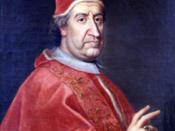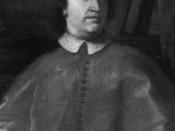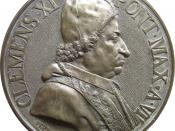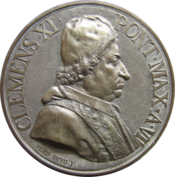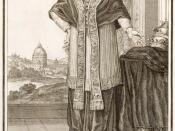Giovanni Francesco Albani was born on the 23rd of March, 1649. Unbeknownst to all at the time, this man would rise to become one of the most powerful political and spiritual leaders of his time. In fact, even kings would submit to his authority, although his reign as pope would mark the beginning of the decline of papal power.
Albani, later to be known as Pope Clement XI, was born in the town of Urbino, Italy. His family was a noble family that included senators and prefects. Albani received extensive education in his earlier years, and was sent to finish his studies at the Roman College at eleven years old. First known as an author at age eighteen, Albani was soon noticed by Queen Christina of Sweden, who enrolled him in her Royal Academia. He majored in theology and law, and was granted the title of doctor of canon and civil law.
A firm supporter of strong morals, Albani gained favor with the Catholic Church, and was appointed cardinal-deacon at the age of twenty-one and Prelate of Rieti at the age of twenty-eight. Due to his excellence in leading, Albani was recalled to Rome and given the position of Vicar of St. PeterÃÂs, and then later promoted to Secretary of Papal Briefs. As this job required an extensive knowledge of Latin, Albani held this position for more than thirteen ears. In 1700, a tragedy occurred when the current pope, Pope Innocent XII, died. The ChurchÃÂs original nominee, Cardinal Mariscotti, was rejected by France, after which Cardinal Albani was unanimously elected to the prestigious post. Albani was only fifty-one years old at the time; very young for a pope. At first, Albani was reluctant to receive this position, and for three days efforts were made to convince him that it was best for the Church. Finally, Albani decided to follow the will of God, and on the 8th of December, 1700, was enthroned in the Vatican as Pope Clement XI.
Pope Clement XI accomplished many great achievements during his lifetime. Unlike many corrupt popes before him, he did not bestow clerical offices upon anyone unless he deemed them worthy and capable enough for the role. He did not tolerate corruption in those he had authority over, and worked almost constantly in an attempt to better the Church and the world that it affected. He improved conditions of prisons, set up charities for the poor, and provided food for the populace in times of scarcity. He also gained the respect of artists and scientists by prohibiting the exportation of ancient masterpieces, and by supporting a great scientist and historian of the time, Francesco Bianchini. He was the first to organize the Church in the Philippines, as well as sending missionaries all over the world. He added to the Vatican Library at his own expense, donating manuscripts gathered by Joseph Assemani in his journeys through Egypt and Syria. He regularized the synchronization of time by ordering that all clocks in Rome be matched to a sundial. He slept little and ate less, and always dedicated his entire attention to any task set before him until completed.
Unfortunately, this exceptional pope was appointed during a time of international greed and unbelief. France and the Austrian Empire, both vying for the succession to the Spanish throne, brought about his first troubles. Charles II, the latest Spanish king, had died childless, designating in his will that Phillip of Anjou, grandson of Louis XIV of France, should receive the throne. However, both Austrian Emperor Leopold and Archduke Charles of Spain resented this succession. Pope Clement XI elected to remain neutral during the following contest, but that proved impossible. At first, he hesitantly recognized Phillip V as king of Spain, but when LeopoldÃÂs successor, Joseph I, invaded the Papal States, the pope was forced to recognize Archduke Charles as the new Spanish king. From this point onward, Pope Clement XI was held almost in contempt by the majority of European leaders. The Peace of Utrecht, an exceedingly important peace treaty between several European powers, was conducted without regards to the rights of the pope and the Catholic Church. The new Spanish king also excluded practically any papal authority over the church in Sicily. Pope Clement XI attempted to counteract this with an interdict, but the king then banished 3000 clergy who still supported the pope. The pope also had to provide for these unfortunate clergy.
Pope Clement XIÃÂs two largest religious disagreements occurred with the Chinese Christians and later with the Jansenists. He opposed all ancestor worship in China, despite the fact that much of it was done for cultural traditions rather than actual worship. As a result, the missionaries were rejected in China, and the missionary movement to that country was practically killed off. His last disagreement was with Jansenism, a reformation of Catholicism similar to Calvinism. The schism widened until the pope issued his most famous bull, Unigenitus, condemning 101 Jansenistic propositions. However, this bull caused another split in the Catholic Church as several cardinals refused to accept it.
Although Pope Clement XI is most known for marking the beginning of the loss of papal power, this great man also accomplished many great things during his lifetime and at one time was one of most powerful men in the world. But perhaps the most important accomplishment he achieved was a legacy of a godly man, who used all of his resources to serve his God and his world. On March 19th, 1721, Pope Clement XI was finally laid to rest.
Bibliography:- ÃÂPope Clement XI,ÃÂ New Advent, http://www.newadvent.org/cathen/04029a.htm (May 30, 2008).
- ÃÂPope Clement XI,ÃÂ NNDB, http://www.nndb.com/people/214/000094929/ (May 30, 2008).
- ÃÂCondemnation of the errors of Paschasius Quesnel,ÃÂ Papal Encyclicals Online, http://www.papalencyclicals.net/Clem11/c11unige.htm (May 30, 2008).
- ÃÂClement XI,ÃÂ Answers.com, http://www.answers.com/topic/pope-clement-xi (May 30, 2008).
- ÃÂPope Clement XI,ÃÂ Catholic Forum, http://www.catholic-forum.com/saints/pope0243.htm (May 30, 2008).
- ÃÂPope Clement XI: Leading Catholicism 1700-1721,ÃÂ Suite101.com, http://www.suite101.com/article.cfm/catholic_christianity/21137 (May 30, 2008).
- ÃÂPope Clement XI and Bible Reading by the Laity,ÃÂ Bible Light, http://biblelight.net/Bible-Clement-XI.htm (May 30, 2008).
